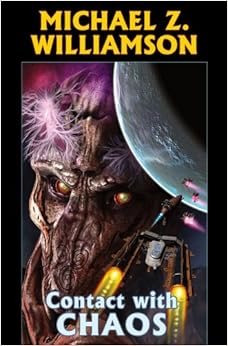In Contact With Chaos, Williamson uses it to explore three very deep ideas.
First is a widely-held perception that primitive equates to innocent or ignorant (as in stupid) or both. The exploration team from Earth and Freehold is surprised when this outlook on their stone-tool-using aliens is shattered again and again by their ability and willingness to use those wood, bone and stone tools in creative and wicked ways.
"...one good thing, they won't have artillery..." Oh, yeah? Ever heard of a trebuchet?
Next is the idea that primitive societies are always tribal or clan-like in structure. Instead, the human teams are confronted with a somewhat capitalistic economy "governed" by a pair of chairmen who can be removed from their posts if they don't deliver as expected. Here, WIlliamson's Freehold team members see the capitalist nature of the alien society, while the Earth team prefers to see the "elected" nature of the governors. Again, this misperception eventually bites them both.
Finally, I found it delightful that the alien scientists learned just as much from what they were not told as from what they were, the alien's military trainers found even the Freehold students in their training classes to be a bit clumsy and hard to train, and that generally, these aliens were shrewd and canny. They played each side of the human team against the other, and managed to keep them guessing and off-balance.
An excellent story that plays well on several levels, this is a worthy addition to the Freehold* series.
* Contact With Chaos does not have the same strong Libertarian/Military themes as the Freehold series, but uses the reader's understanding of those ideas to help drive the story.

No comments:
Post a Comment